
Are you dreaming of a successful blog? Choosing the right hosting platform is crucial for making that dream a reality. Poor hosting can derail your efforts, impacting your blog’s speed, reliability, and overall reader experience. With so many options out there, it’s tough to pinpoint the best hosting for bloggers, but we’ve got you covered.
We’ll navigate you through the key considerations in selecting a host, including performance metrics and user-friendly features. Our blog hosting comparison reveals top contenders and how they stack up against each other. From pricing to support, each factor will help you decide how to choose hosting for your blog.
Rest assured, by the end of this, you’ll have a clear path to the hosting solution that fits your blogging aspirations beautifully. Get ready to enhance your blog’s performance with the right choice tailored just for you.
Disclaimer:-We partner with awesome companies that offer products that help our readers achieve their goals! If you purchase through our partner links, we get paid for the referral at no additional cost! For more information, visit my disclosure page.
What exactly is hosting, and why is it vital for bloggers?
Hosting is like renting space on the internet where your website lives so people can visit it. Choosing the best hosting for bloggers like you can dramatically affect your site’s performance and reliability. When I launched my first blog, I learned this the hard way. Picking the right host felt overwhelming, but once I did, it was a game changer for my blog.
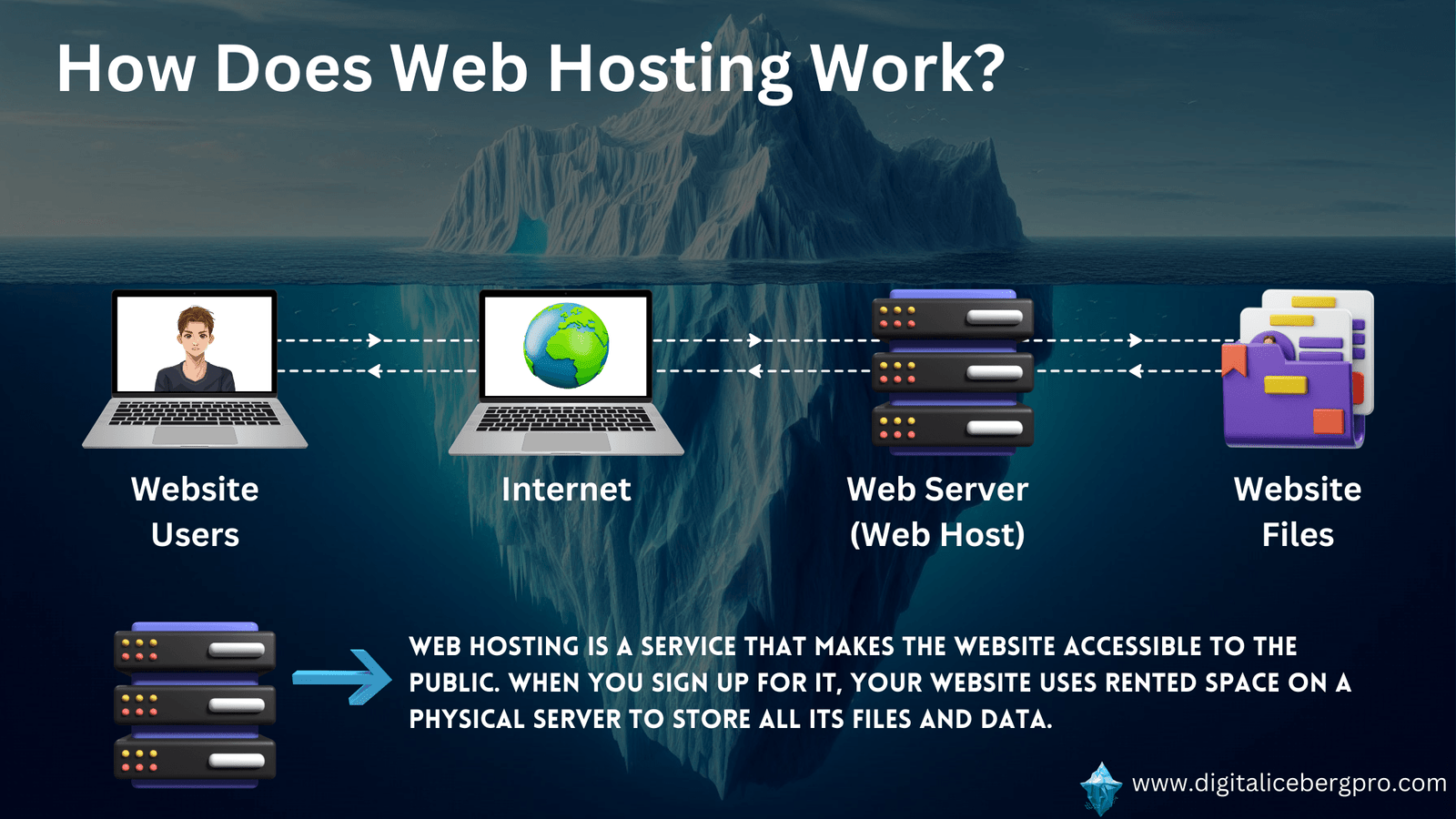
Types of Hosting
There are several types of hosting out there, and the best hosting for bloggers depends on your needs. Shared hosting is the most affordable option, where your site shares server resources with others. For most beginner bloggers, this is a solid choice. As my blog grew, I moved to VPS hosting. It’s a bit more expensive, but it offers better speed and control.
Best Hosting for Bloggers
When I was searching for the best hosting for bloggers, I looked for a balance between price and performance. Bluehost and SiteGround were two options that consistently came up in my research. Both offer excellent support and great uptime, which is essential when your readers expect your blog to be online 24/7. I eventually went with Bluehost because it offered a free domain and was easy to set up for someone like me who didn’t have much technical knowledge at the time.
Considerations for Choosing Blog Hosting
Choosing the best hosting for bloggers is like finding the perfect pair of shoes for a marathon. You want something reliable, comfortable, and built for the long haul. Whether you’re starting your first blog or you’re a seasoned blogger looking for a change, there are several key factors you need to consider to ensure your hosting choice aligns with your blogging goals. Let’s dive into the essentials.
Speed and Performance
Speed is the backbone of a successful blog. Imagine clicking on a website, but waiting forever for it to load—or worse, it doesn’t load at all. We’ve all been there, and it’s not fun. Fast loading times make your blog feel smooth and keep visitors happy. A slow website can lose readers quickly, and even Google prefers faster sites. When evaluating hosting services, prioritize those that offer solid speed and performance.
Uptime Reliability
Uptime reliability is like the attendance record of your blog. Nobody can read what’s not there! A good hosting provider ensures your blog is up and running 24/7. Look for hosts that promise at least 99.9% uptime. This means that your blog will be available almost all the time, which is crucial for growing your audience and maintaining credibility. Check out some reliable options that offer excellent uptime statistics.
Security Features
Security features are your blog’s bodyguards. In an age where cyber threats lurk around every corner, it’s important to keep your site safe. A good host will offer SSL certificates, regular backups, and protection against malware and other threats. These features ensure that your content and your readers’ data remain secure. Cloudways describes its offerings for bloggers, highlighting the importance of security.
Customer Support
Good customer support is like having a friend who knows all about computers. Sometimes, things can go wrong. Maybe there’s an error message, or perhaps something looks off. In these moments, dependable customer support can be a lifesaver, providing quick solutions and guidance. Seek out hosts with 24/7 support and multiple ways to contact them, such as live chat, email, or phone support.
Pricing and Plans
Finally, consider the pricing and plans like you would a phone plan—looking for the one that gives you the best bang for your buck. Different hosts provide a range of pricing options to fit various needs and budgets. It’s crucial to select a plan that matches not only your current needs but also scales with your growing blog without breaking the bank. Quora is a good place to explore thoughtful discussions about cost-effective hosting choices.
Considering these factors will help you make an informed decision about your blogging platform. Remember, the right hosting can be the foundation for success, much like the right training shoes can help you win the race.
Best Hosting Platforms for Bloggers
Choosing the best hosting platform is crucial for bloggers seeking to create a successful and seamless online presence. The right host can make or break your blogging experience, so it’s essential to pick wisely. Here are some top choices available in 2025, each with distinct advantages and tailored solutions for bloggers.
1. Hostinger
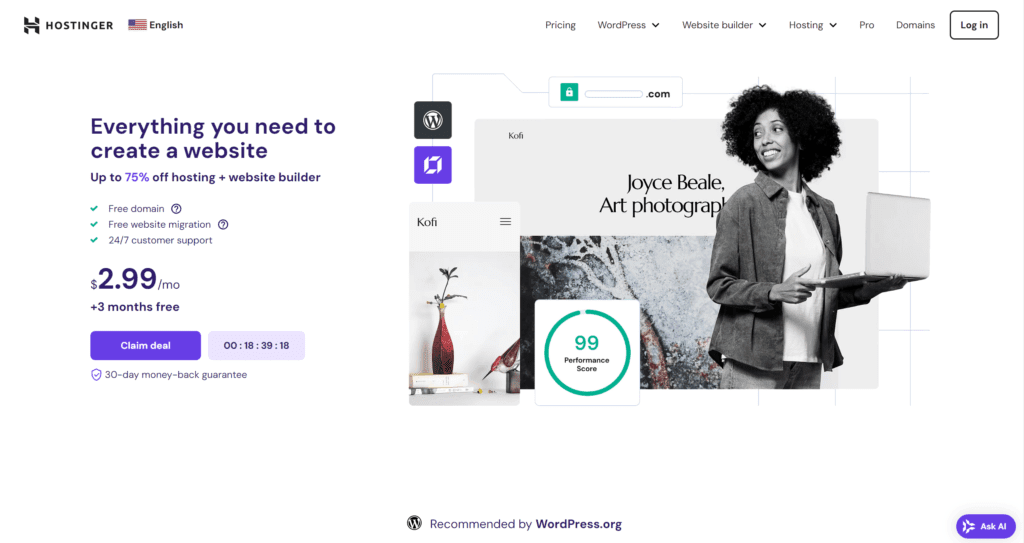
Hostinger is a well-known web hosting provider that offers affordable and high-performance hosting solutions with a focus on beginner-friendly interfaces and excellent customer support.
Features & Benefits:
- Affordable Pricing: Competitive rates make it accessible for beginners and small businesses.
- Fast Load Times: Optimized servers ensure quick page loading speeds.
- User-Friendly Control Panel: Custom hPanel for easy management.
- Free SSL and Domain: Provides a free SSL certificate and domain name with most plans.
- 24/7 Customer Support: Responsive support via chat for troubleshooting.
Pros and Cons:
| Pros | Cons |
|---|---|
| Very affordable pricing | Limited support for complex needs |
| Fast server speeds | No daily backups on lower-tier plans |
| Easy-to-use control panel | No phone support |
Pricing Plans:
- Single Shared Hosting: Starts at $1.99/month, best for one website.
- Premium Shared Hosting: $2.99/month, includes more resources and a free domain.
- Business Shared Hosting: $3.99/month, offers daily backups and enhanced performance.
- VPS and Cloud Hosting: Custom pricing depending on specifications.
Best Use Case:
- Best For: Beginners, small websites, startups, and users who need budget-friendly yet reliable hosting solutions.
2. Cloudways
Cloudways is a managed cloud hosting platform that offers high performance, flexibility, and simplicity for developers, agencies, and eCommerce businesses.

Features & Benefits:
- Managed Cloud Hosting: Supports multiple cloud providers (e.g., AWS, Google Cloud).
- Scalability: Easily scale server resources as your website grows.
- Free SSL and Automated Backups: Ensures security and data protection.
- 24/7 Expert Support: Access to support via chat and ticketing system.
- Performance Optimization: Advanced caching, SSD-based hosting, and CDN for faster load times.
Pros and Cons:
| Pros | Cons |
|---|---|
| High-performance and scalable | More technical than traditional hosting |
| Multiple cloud provider options | No domain registration |
| Pay-as-you-go pricing | No email hosting |
Pricing Plans:
- Starts at $12/month for DigitalOcean servers. Pricing varies based on server provider and specifications (e.g., AWS, Google Cloud).
Best Use Case:
- Best For: Developers, agencies, and businesses needing high-performance, scalable, and managed cloud hosting.
3. ChemiCloud
ChemiCloud is a hosting provider known for its excellent customer support, fast performance, and reliability. It offers a range of hosting services, including shared, WordPress, reseller, and cloud hosting.
ChemiCloud offers a robust hosting experience with a focus on support and reliability, making it a strong contender for blog hosting.
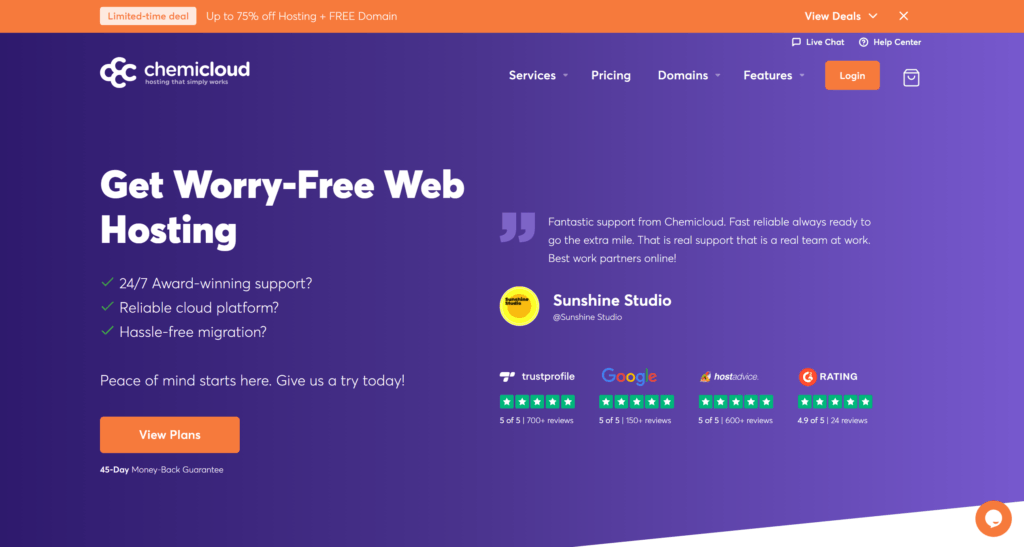
Features & Benefits:
- Free Domain for Life: Enjoy a free domain as long as you have an active hosting plan.
- Free Daily Backups: Automatic daily backups ensure data safety.
- 24/7 Expert Support: Award-winning support available round the clock.
- 99.99% Uptime Guarantee: Reliable uptime for consistent website performance.
- Free SSL and CDN: Enhance security and website speed.
Pros and Cons:
| Pros | Cons |
|---|---|
| Excellent customer support | Higher pricing compared to some hosts |
| Free daily backups | No VPS or dedicated server options |
| Free domain and SSL | Renewal rates can be expensive |
Pricing Plans:
- Shared Hosting: Starts at $4.48/month.
- WordPress Hosting: Starts at $4.48/month.
- Reseller Hosting: Starts at $19.95/month.
- VPS and Cloud Hosting: Custom pricing based on requirements.
Best Use Case:
- Best For: Small to medium-sized businesses, personal blogs, and websites needing reliable support and performance.
4. Bluehost
Bluehost is a popular web hosting provider known for its reliable services, user-friendly interface, and WordPress integration. check out their website.
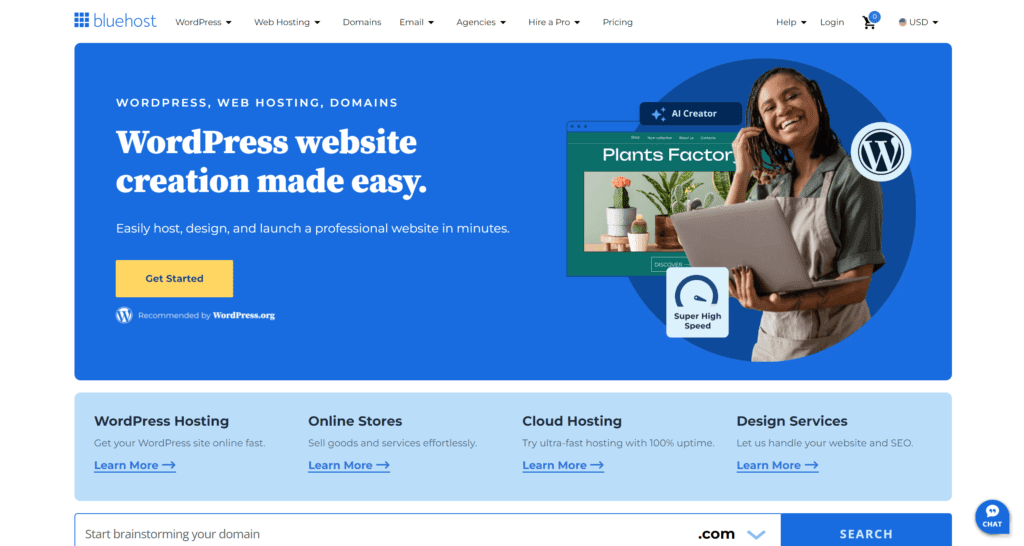
Features & Benefits:
- One-Click WordPress Installation: Seamless integration with WordPress, making it easy to set up websites.
- Free Domain Name: Offers a free domain for the first year.
- Free SSL Certificate: Enhances security and boosts SEO.
- 24/7 Customer Support: Provides round-the-clock assistance through chat, phone, and email.
- Resource Protection: Ensures optimal performance by monitoring and managing server resources.
Pros and Cons:
| Pros | Cons |
|---|---|
| Easy to use, especially for beginners | Higher renewal rates |
| Excellent uptime and performance | Upsells during the checkout process |
| Free domain and SSL | No monthly billing on shared hosting |
Pricing Plans:
- Basic Plan: Starts at $2.95/month (introductory price), suitable for beginners.
- Plus Plan: $5.45/month, includes unlimited websites and storage.
- Choice Plus Plan: $5.45/month, with added privacy features.
- Pro Plan: $13.95/month, for higher performance and additional features.
Best Use Case:
- Best For: Beginners, small to medium-sized businesses, and WordPress users looking for reliable hosting with excellent customer support and a simple setup process.
5. A2 Hosting
A2 Hosting is a popular web hosting provider known for its high-speed performance, reliable uptime, and developer-friendly environment. It offers shared, VPS, dedicated, and reseller hosting options suitable for various website needs.
A2 Hosting is the go-to for tech enthusiasts, offering customization and speed, as highlighted in this comprehensive review.
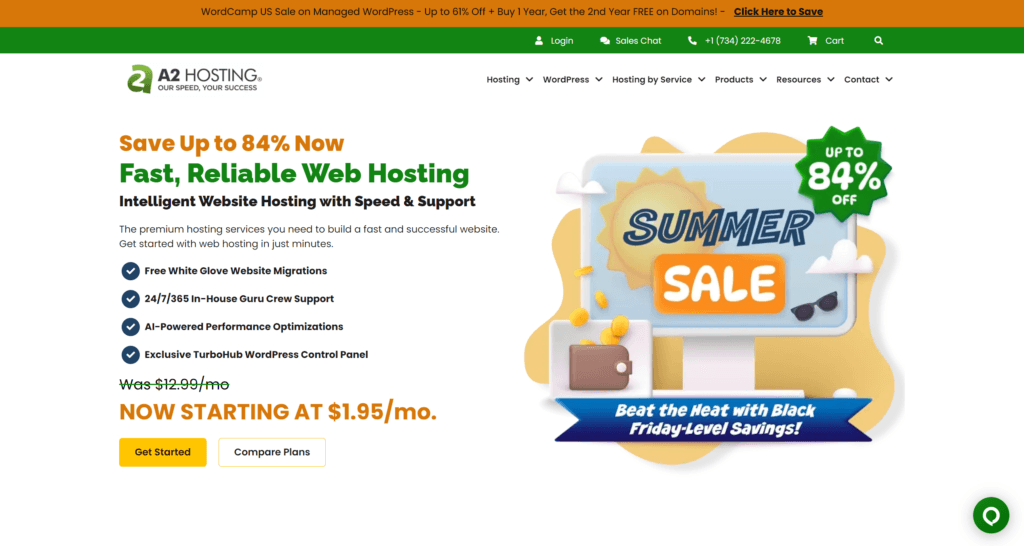
Features & Benefits:
- Turbo Servers: Up to 20x faster page load times.
- Free Site Migrations: Hassle-free transfer of your existing websites.
- Enhanced Security: Free SSL certificates and advanced security features.
- Anytime Money-Back Guarantee: Flexibility with refunds.
- Developer-Friendly: Supports a wide range of software and developer tools.
Pros and Cons:
| Pros | Cons |
|---|---|
| Excellent speed and performance | Higher renewal rates |
| 24/7 customer support | Interface can be overwhelming for newbies |
| Free site migration and SSL | Turbo plans are more expensive |
Pricing Plans:
- Startup Plan: $2.99/month – Suitable for a single website.
- Drive Plan: $5.99/month – Unlimited websites and storage.
- Turbo Boost Plan: $6.99/month – Turbo servers for better performance.
- Turbo Max Plan: $12.99/month – Best speed and resources.
Best Use Case:
- Best For: Developers, small to medium-sized businesses, eCommerce sites, and users needing fast and reliable hosting with advanced features.
Selecting the best hosting for bloggers is about finding the right balance between capabilities, cost, and convenience. These options provide excellent starting points depending on your unique needs and goals.
How to Choose Hosting for Your Blog?
When starting a blog, choosing the right hosting service is a crucial step. The hosting service you select can impact your blog’s performance, security, and growth potential. Finding the best fit among the many available options can feel like searching for the perfect pair of shoes. But with a thoughtful approach, you can find the hosting that fits your blog like a glove. Let’s break it down into some simple steps.
Assess Your Blog’s Growth Potential and Needs
Before jumping into any decisions about best hosting for bloggers, take a moment to visualize your blog’s future. Is it a passion project or a budding business?
- Traffic Expectations: Estimate how many visitors you expect in the first few months. Is it a small audience or do you plan to grow quickly?
- Content Frequency: How often do you intend to publish new content? More frequent updates might require robust hosting to handle increased traffic.
- Functionality: Determine the features your blog will need, such as high-quality images, videos, or e-commerce capabilities.
Assessing these factors helps in understanding which hosting services might be capable of supporting your blog as it grows.
Determine Essential Features Based on Blog Type
Not all blogs are created equal. Personal blogs have different needs compared to business or multimedia blogs.
- Personal Blogs: If your blog is personal, you might not need advanced hosting features. Services like WordPress.com offer free and simple solutions.
- Business Blogs: Businesses should focus on reliability and scalability. A hosting provider like Bluehost might offer what you need for growth.
- Multimedia Blogs: For blogs that use large images or videos, ensure your host provides sufficient bandwidth and storage.
Making sure your host offers the essential features for your specific blog type can prevent future headaches when your blog evolves.
Consider Budget Constraints and Long-Term Goals
It might be tempting to go for the cheapest option, but remember, hosting is an investment in your blog’s future.
- Budget Planning: Determine what you can afford monthly and look for hosting plans within that range.
- Price vs. Value: Compare the features offered at different price points. Sometimes paying a little more upfront can save you costly upgrades later.
- Long-Term Goals: Consider where you want your blog to be in 5 years. Selecting a host that can scale with your ambitions is a wise move.
Balancing your budget with the best hosting for bloggers ensures you are not only saving money but also setting a solid groundwork for future success.
Remember, choosing hosting for your blog is not just about what suits you today but what will still be working well several years down the line. Follow these steps, and you’ll be on your way to making a smart, informed decision.
Frequently Asked Questions about Blog Hosting
Navigating the world of blog hosting can sometimes feel like solving a puzzle. We all want the best hosting for bloggers, but questions are bound to arise. Here are some common questions answered to guide you through making the right choices for your blogging endeavors.
What features should I prioritize for blog hosting?
Choosing the right hosting features is pivotal to getting your blog set up just the way you want. Here’s what to prioritize:
Uptime and Reliability: This ensures your blog is accessible whenever readers want to visit. A host with 99.9% uptime is generally reliable.
Speed: Faster load times mean happier readers and better SEO. Look for features like SSD storage and content delivery networks (CDNs).
Security: Consider SSL certificates, firewalls, and regular backups to keep your blog safe from cyber threats.
Customer Support: 24/7 support can be a lifesaver if you encounter problems.
For more on selecting the best hosting for bloggers, check out Location Rebel’s guide to choosing the best hosting service for your blog.
How does hosting impact my blog’s SEO?
Hosting impacts SEO in more ways than you’d think. A few key factors include:
Page Speed: Fast loading times not only keep your audience engaged but also improve search engine rankings.
Downtime: Frequent downtime can negatively impact your blog’s ranking as search engines may mark it unreliable.
Server Location: Hosting your blog on servers close to your target audience can improve load times and user experience.
To dive deeper into how hosting ties into SEO, you might find HubSpot’s insights on choosing the best blog hosting sites useful.
Can I switch hosting providers without downtime?
Switching hosting providers might sound daunting, but it can usually be done without any downtime if handled carefully. Here’s how:
Back Up Your Site: Before making any changes, ensure you have a complete backup.
Duplicate Your Site: Most hosting providers offer tooling or guidance to clone your site to a new server.
Domain Name System (DNS) Settings: Update your DNS settings to point to the new host after the transfer is complete to avoid downtime.
For a step-by-step guide on switching hosts, you can learn more on Reddit.
Which hosting is best for blogs with high traffic?
For high-traffic blogs, opting for a robust hosting solution is critical:
VPS Hosting: Provides dedicated resources suitable for handling increased traffic with greater stability.
Cloud Hosting: Offers scalability to manage traffic spikes without slowing down.
Dedicated Hosting: Perfect if you require the highest levels of control and performance.
Explore more options in this guide to the best blog hosting providers of 2024.
How do I secure my blog on a shared hosting plan?
Securing a blog on shared hosting requires a few smart moves:
SSL Certificates: Encrypts data between your site and your visitors for an added layer of security.
Regular Backups: Ensure your data is safe by scheduling routine backups.
Security Plugins: Use plugins that detect and prevent malicious attempts.
Strong Passwords: Regularly update passwords and enable two-factor authentication.
To ensure your hosting provider supports these security features, consider reading Productive Blogging’s advice on choosing the right host.
Equipped with this knowledge, we hope you feel more confident in your choices about best hosting for bloggers. Remember, the right hosting service will strengthen your blog’s foundation, helping you to engage and grow your audience effectively.
Conclusion
Choosing the best hosting for bloggers is crucial for success. Reliable hosting ensures that your blog remains accessible and fast, crucial for retaining readers and ranking well in search engines. HostGator and DreamHost stand out as strong contenders, but each blogger’s needs differ. Pricing, customer support, and server performance are vital factors to weigh.
We recommend evaluating your specific requirements, such as storage needs and anticipated traffic. It’s equally important to consider the ease of use if you’re new to blogging. Whether you’re just starting or looking to scale, investing time in comparing hosting options will pay off in the long term.
Thank you for joining us in exploring this essential step in your blogging journey. Feel free to share your thoughts or questions. Let’s keep the conversation going and explore further together!


